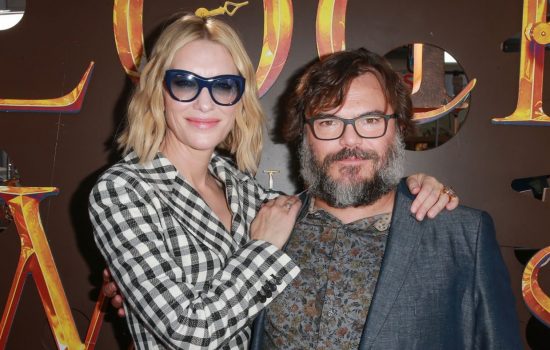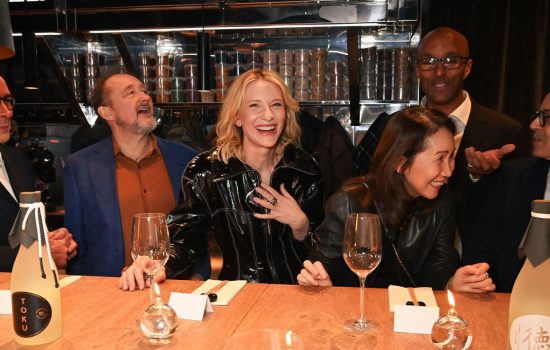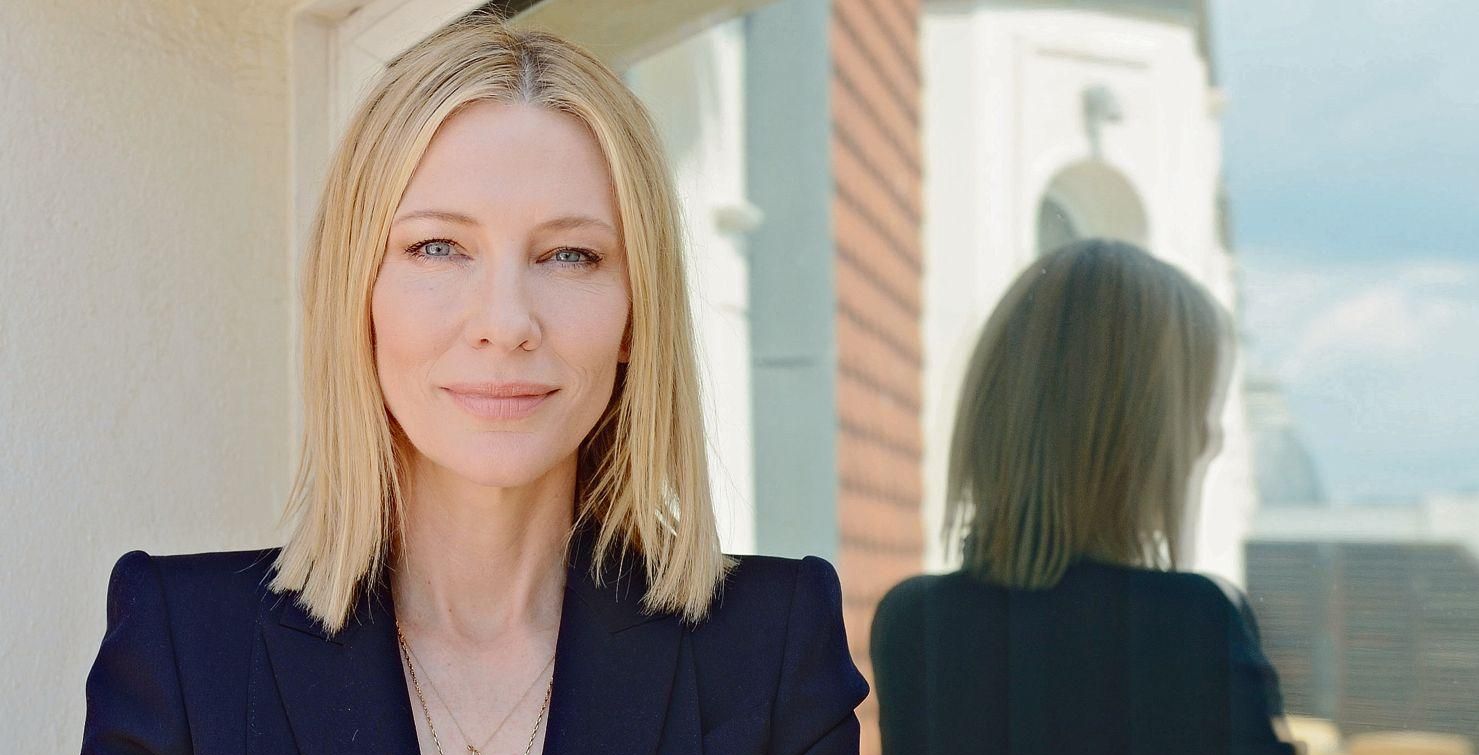Cate Blanchett was featured on Hello! Magazine Issue No. 1831, she discussed about working on THE NEW BOY. Apart from the film’s release in UK and Ireland on Friday, it will also be released in Greece by One from the Heart Films beginning 21 March, it premiered in Greece at Thessaloniki Film Festival last year. The film will be screened at Miami Film Festival on 13 April, tickets can be booked here.
Cate Blanchett and her theatre director husband Andrew Upton are among The New Boy’s co-producers and worked closely together during filming. Yet she had no qualms about spending so much time with her spouse, whom she married in 1997 and with whom she has four children. “For us it works, although at first people looked at us in horror, like: How could you be with one another 24/7?” she says. “We do argue, but in a constructive way that has good creative results. But we’ve always worked together. We’ve been married a long time, so something is working.”
She says she was delighted to be back working in Australia, having overcome an initial obstacle in the fact that her character Sister Eileen was originally written for a man. “That came about through my husband and I being desperate to work with Warwick Thornton, a director we have long admired,” she says. “We were speaking to Warwick about doing something and that’s when he mentioned the script he had been working on with [writer] Kath Shelper. The script was incredible, but the main character was a priest rather than a nun. It was Andrew who suggested that switch and now here we are. It was wonderful to go home and to work with an Australian director who really understands the country and really speaks to Australians as well as an international audience.”
The “new boy” of the film’s title is an Indigenous child played by Aswan Reid, in his first acting role. “Aswan is incredible – we couldn’t have made the film without him,” Cate says. “This is his first role and he’s in every single scene. He had never so much as been on a film set before this, but he had so much discipline and curiosity about everything that was happening around him. I think his performance is incredible.”
She says her instinct as a mum kicked in during the shoot, when she took Aswan under her wing. “I have four kids, three of them boys so I couldn’t help it. I loved working with not only Aswan, but all the boys in the monastery. They were extraordinary. Everyone on set fell in love with them all. Their families were with them because this was rural South Australia and we were all away from home, so we looked after each other,” she says.
“We were staying in a little mining town so there wasn’t anything to do. But Warwick did this wonderful thing with Nick Meyer, our editor. Every Friday, they gave a masterclass on editing, so the kids could see themselves up on screen and understand the process of filming from so many angles and using so many takes. Sometimes they would cut the footage together like a tragedy, or the next time might be a comedy. Everyone loved it.”
And having enthused about the technical process, Cate reveals that she enjoys being behind the camera, rather than in front of it. “I’m always trying to get out of the acting,” she says with a laugh. “It’s almost a relief for me if I don’t have to act. I remember when Andrew and I were running the Sydney Theatre Company – if it was a show we had produced, I had a profound sense of relief in wishing the actors good luck before they went out on stage. Maybe one day I will direct, but it’s all a matter of time, because projects take so long to develop. I also have four children and a garden, so it’s a lot.”

The New Boy opens by spelling out the context in brutal black and white: “For most of the 20th century, it was Australian government policy to breed out the black. This involved separating Indigenous children from their parents and their culture. The church and its missions were integral to much of this policy enactment.”
This is a film that looks exquisite and centres on a simple story. A young boy, played beautifully by Aswan Reid, arrives at the orphanage Sister Eileen (Blanchett) runs in the absence of the priest in charge. But this is also a film with something serious to say about this country’s colonial past, about the politics of today, and about so much more in its exploration of Indigenous spirituality coming into contact with unbending organised Christianity.
“So the film came out of a very personal, angry place, I think, for Warwick. When we were filming it, he was wrestling with that young black man’s anger that is totally justifiable and understandable and is still inside him. But he was also wanting to make a film with a great deal of curiosity and tenderness. That wrestle was really complicated for him.” While Thornton was forced into it, Blanchett grew up fascinated by the Catholic Church.
“Not being raised at all religiously, I had such a desire to be part of the Catholic Church. I would go along with my best friend from primary school on Sundays – and just the smells of it, and the smutty jokes that were said under people’s breath, the profound ritual…” she says. “And also the way none of them wanted to go, but they went anyway. It was rife with conflict, highly theatrical, fraught with mystery. You just knew there was a lot of subterranean stuff going on. If anything is going to teach you subtext, it’s going to Catholic mass! So we connected over this fascination – but also the deep wound we both sort of felt. Mine of longing and yearning and his as a deep experience with organised religion versus Indigenous spirituality, which is such an ongoing conflict in Australia.”
The film comes in the wake of The Woman In The Wall on television and new Cillian Murphy film Small Things Like These in examining how the state and state sponsored religion treats people society seeks to lock out, to correct, to change, to hide away.
If a reckoning is happening, it’s long overdue. Because there are New Boys everywhere. Displaced and vulnerable people, arriving in new, unfamiliar spaces. Fast forward 80 years from this fictional film and they are too often received with no more empathy, understanding, warmth or welcome.
“Exactly. We have to respect vulnerable people’s resilience and place ourselves in their shoes. I’m not remotely religious, but isn’t that what Jesus said? We forget the basic tenets,” says Blanchett. “But it is interesting, what you’re saying about New Boys being everywhere. How people on the so-called inside have a terrible fear of being on the outside, so when someone comes in from outside, they assume predatory motives, that they’re there to break apart the community. All people I’ve spoken to on the outside, who are displaced, who are without a home, who have been ousted from their family circle or community, they look at the community with intense curiosity. How can I contribute? What can I do? Dogma can lead to an incurious response to people. Even the notion of being observed by an outsider can seem like a threat they have to smother. So rather than a community, it becomes a citadel very quickly.”
 Welcome to Cate Blanchett Fan, your prime resource for all things Cate Blanchett. Here you'll find all the latest news, pictures and information. You may know the Academy Award Winner from movies such as Elizabeth, Blue Jasmine, Carol, The Aviator, Lord of The Rings, Thor: Ragnarok, among many others. We hope you enjoy your stay and have fun!
Welcome to Cate Blanchett Fan, your prime resource for all things Cate Blanchett. Here you'll find all the latest news, pictures and information. You may know the Academy Award Winner from movies such as Elizabeth, Blue Jasmine, Carol, The Aviator, Lord of The Rings, Thor: Ragnarok, among many others. We hope you enjoy your stay and have fun! 





 A Manual for Cleaning Women (202?)
A Manual for Cleaning Women (202?) The Seagull (2025)
The Seagull (2025) Bozo Over Roses (2025)
Bozo Over Roses (2025) Black Bag (2025)
Black Bag (2025)  Father Mother Brother Sister (2025)
Father Mother Brother Sister (2025)  Disclaimer (2024)
Disclaimer (2024)  Rumours (2024)
Rumours (2024)  Borderlands (2024)
Borderlands (2024)  The New Boy (2023)
The New Boy (2023) 











